Through the Looking Glass; a Blended Herstory
Written by Dee Brooks
Warning: indulgent personal history following – grab a cuppa &put your feet up!
You have created a great synthesis of methods… The ones I know of are compatible, in my mind – especially AIJohn McKnight, ABCD Institute, IL
very interesting and powerful story so far – and with more to come methinks!Toke Moller, Interchange, DM
I’ve been feeling unsettled lately. It started when I read a blog by a self-proclaimed ‘master of community work’ practitioner who espoused the benefits of one particular methodological practice, above all others. It made me uneasy because it essentially negated half of my life’s work, which is; to find effective intersections in community building practices in order to engage community members in meaningful conversations that will support their individual dreams and broader community’s hopes and aspirations.
So, this got me thinking; for almost two decades, I have been working in communities; teaching and learning from countless individuals, supporting local businesses, guiding organisations and services and often flying under the radar…
I’ve been so caught up in my day to day work that I haven’t shared enough of the lessons I’ve gleaned from these experiences so, 2016 is my year to change that; I plan on writing and sharing, as openly as possible, the tips, tools and treasures of almost two decade’s worth of community, engagement, development and capacity building work.
When I was working with young people in drop-in centres in the Hunter Valley, NSW, Australia, I was always looking for ways to highlight the skills and abilities of young people and see them as an important part of a local community, rather than a group with problems to be rectified, and this is when I first heard Jody Kretzmann talk about Asset-based Community Development and it changed my working world.
Laying the Foundations .
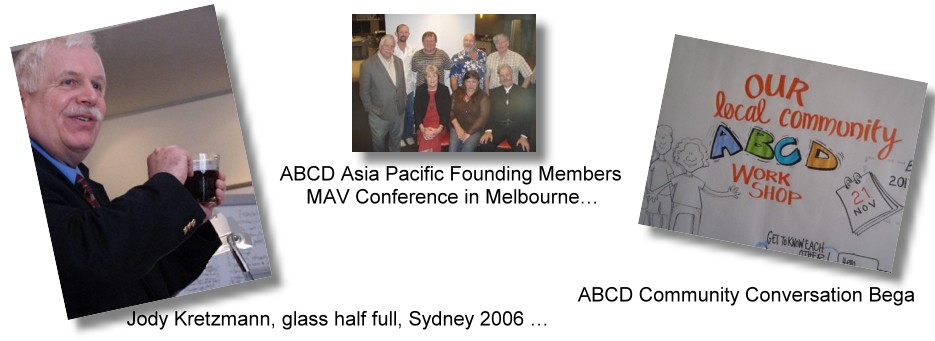
How:Asset-based community development (ABCD)
When I first started applying ABCD in the early 2000’s, I was excited to discover a framework and supporting strategies to strengthen the work I was already doing. Subsequently, ABCD has been a part of my life since and, like other practitioners I meet in my travels, I was unknowingly using the principles of ABCD before I had heard of the term asset-based largely because my natural modus operandi is to look for the strengths, gifts and passion in people.
Why do I blend?
Not long after this revelation, I started working with the Family Action Centre (FAC) based at the University of Newcastle, NSW, Australia. The FAC were the ground-breaking organisation who invited and hosted Jody Kretzmann in Australia for more than a decade, and they were pivotal in providing national training; I had landed in the midst of innovation and over the next decade, the FAC also introduced me to Results Based Accountability (RBA) and DRUMBEAT– both practices of which I either apply and/or train people in to this day in conjunction with ABCD!
During the early days with FAC I started applying ABCD whilst working with a team of outreach workers who supported permanent residents living in caravan parks throughout the Hunter Valley. These residents were often transient, and discovering ways to increase community capacity when there were often multiple issues, was a challenge but, also very rewarding. Finding ways to increase community capacity became “as easy as ABCD”.
During this time, alongside my practical application of ABCD in caravan park communities, I had started delivering local and then national training, speaking with students on behalf of different departments throughout the university, supported services and organisations with implementation and presented papers and workshops at conferences.
My ABCD work at the FAC increased and, with the exceptional managerial support of Judi Geggie, I shifted into a self-funded training and facilitation position. In 2006, I was a co-founder of the ABCD Asia Pacific network and helped organize both the 2008 and 2010 Strengths and Assets Summits hosted by the Family Action Centre! These were extremely formative years!
Powerful Stories
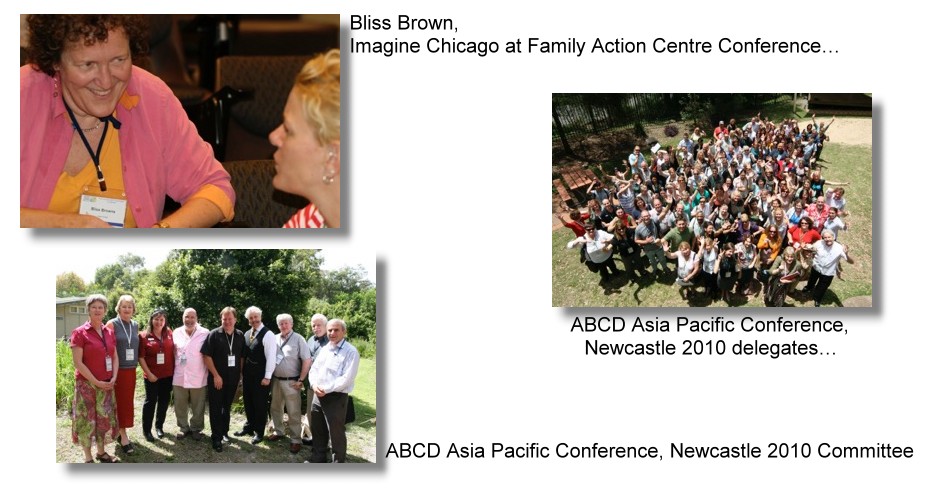
How: ABCD, Appreciative Inquiry
At one of the FAC Summits, I was fortunate to spend time with one of the Keynote Speakers, Bliss Brown, from Imagine Chicago, who inspired people to apply Appreciative Inquiry within their existing ABCD community work. This spurred me on to discover how to form good questions in order to gather powerful stories from community members and I ensured, from then on, that the angle of my questioning in workshops,training and community conversations was strengths-based, AI-focused and complemented my ABCD work.
It was also after this particular conference, with the encouragement of many participants, and the conversations between Bliss and Jody, that Bliss Brown and Jody Kretzmann returned to the US and co-hosted an ABCD & Appreciative Inquiry Masterclass; the first of its’ type in the world! Unfortunately, I could not attend but I remember thinking “If Jody and Bliss see that ABCD & AI work together so well, what other practices might blend to further strengthen community work?”
Between 2010 and 2012, Graeme Stuart, from the FAC and Sustaining Community blog, and I delivered ABCD workshops for the Australian Defence Force’s (ADF) Defence Community Organisation (DCO) across Australia and wrote an article on AI and ABCD for the DCO for the International Journal of Appreciative Inquiry. I developed a ‘potential questions’ handout to help myself, and others, to identify the two paths of community conversations; ones that were ready to move forward using AI and others who were ‘stuck’ using Learning Conversations. The framework was underpinned by strong, AI-style questions and I learned how to effectively SOAR, not SWOT!
I noticed the increasing application of some of these frameworks within emerging models. They highlighted the benefits of adopting a model of abundance, rather than getting stuck in a deficit model. The emerging work was supporting the skills, abilities and capacities of individuals and communities. In particular, 2 of these models were Timebanks and Place-Making approaches, both of which emerged in the 90’s but were significantly increasing in popularity and tapped into the ‘glass half-full’. I was asked to speak at Timebanking and Placemaking conferences and forums a number of times; the synergies with communities and practitioners who were taking an ABCD approach was a no-brainer!
ABCD was the core of my work and as I watched and learned, it grew into the main body which continued to occupy my waking, and many sleeping, hours and with the added benefit of AI, my main body of work was now flexing its’ muscles!
Discovering Care
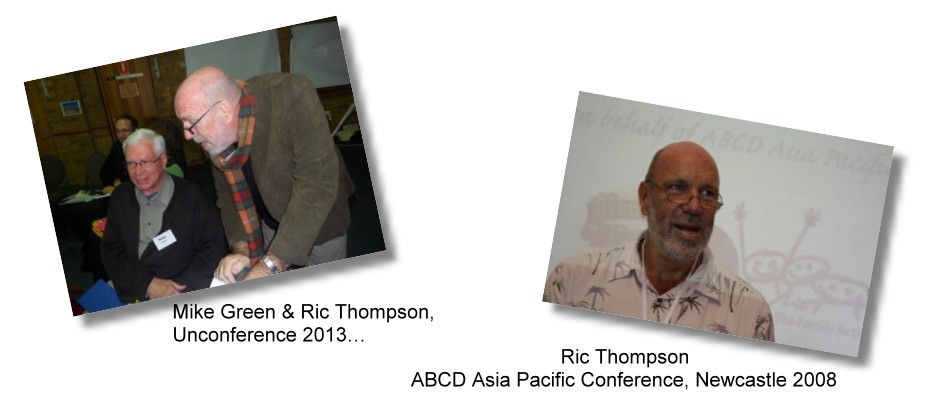
How: ABCD for Inclusion, Person Centred Thinking
In 2006, Mike Green from ABCD for Inclusion and person-centred thinking was touring Australia, hosted by the Family Action Centre, and I was lucky to spend some quality time with him. After travelling and co-facilitating with Mike, my groundwork shifted and the values of inclusion started to show up heavily in my work. Individual stories of hope and change showed the readiness of people to connect more broadly in community and my ABCD work became more based on conversations, using an AI question framework, and connecting community members at the neighbourhood level. Another significant influence was the work of Ric Thompson from Inclusion Works&Great Ideas in Actionin blending ABCD with the principles of inclusion and both Ric and Mike’s work inspired me to emphasise the power of intentional, individual conversations which supported community member empowerment.
Over the next several years, I was asked to facilitate and train many people in the disabilities field, which opened my networks in new and exciting ways and I co-developed and currently deliver Person Centred, Community Driven (PCCD) workshops, which blend ABCD with person-centred thinking, with Michaela Kennedy, co-Director from the Jeder Institute.
Graphic Facilitation and Recording is a strong practice of the inclusion work and based on the work of Jack Pearpoint and John O’Brien, Michaela strengthened our work with MAPS & PATHS; a visual framework to support individual planning and, by walking our own talk, we have also used the framework for collective planning within the Jeder Institute.
ABCD was still my foundation, AI underpinned the angle of questioning and story gathering and combined with person-centred thinking this body of work now had a larger, inclusive heart!
The Divergence
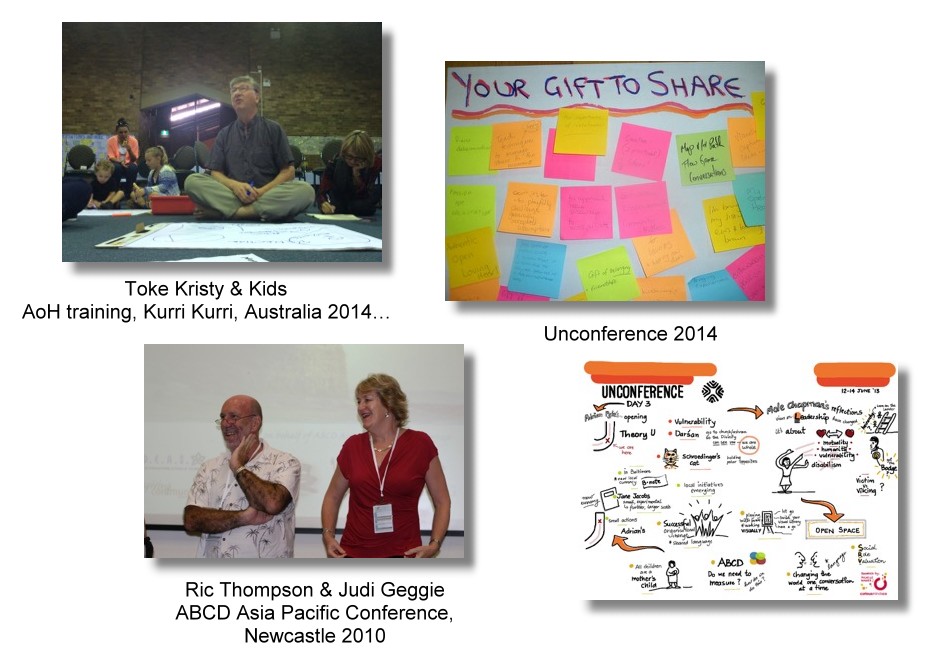
How: ABCD, Appreciative Inquiry,Art of Hosting,Theory U, Divergent, Emergent & Convergent Thinking, World Café, Open Space Technology, 4-fold Practice, Circle Methodology, Chaordic Path, GetStoried
While Mike Green was visiting Australia he told me that the first Australian Art of Hosting& Harvesting(AoH) training would be in Victoria, Australia later that year and highly encouraged me to attend.
This training was life changing and opened up a world of possibilities! Some processes or theories were slow-burners and I found that the ones I didn’t use in the early days ended up being the ones I now use most!
I returned to Newcastle with renewed vigor and started blending the Art of Hosting practices and principles into my ABCD work. Effectively, I started to deepen my personal practice and support organisations and services to further embed and implement their ideas and actions by applying participatory leadership processes to community building work.
My ABCD work had deepened beyond measure; the initial body of work, which was now blended with practices of mind and heart, had something new – it had AoH soul!
Word got around pretty quickly and I was very soon being asked to facilitate planning sessions, forums and conferences. This was leading to new, albeit familiar, ground and I studied entrepreneurship & social innovation through UPeace’s Centre for Executive Education where I first discovered Collective Impact or as many ABCD practitioners called it; Collective Action.
Collective Impact (CI) was another practice that was familiar. Similar to when I had first discovered ABCD, I had unknowingly been applying the principles of CI for many years but didn’t use the language. At first, CI, as it was presented, seemed too rigid to fit into the flexible ways of participatory leadership but, thanks to Dan Duncan’s inspired article “Effective Collective Impact: Through the Power of ABCD and RBA”, my ideas around CI’s rigidity have shifted.
I spoke with RBA founder, Mark Friedman in Sydney in 2015 and he said he could see how ABCD could be the vehicle to move community through RBA to achieve Collective Impact! In addition to Dan’s article, it made perfect sense and added to my converging thoughts of how strengths-focused practices could best complement and enhance each other.
During these formative years at the FAC, I delivered hundreds of workshops and events to thousands of people, facilitated numerous planning and convening sessions and continued to blend ABCD with the Art of Hosting practices. Many of these ABCD workshops were co-facilitated with Graeme Stuart and participatory leadership processes were the perfect vehicles for participants to discover action in workshops.
The power of stories, particularly using Appreciative Inquiry as a base for inquiry, became an increasing part of sharing ‘what works’ in communities and during this time I discovered an innovative storytelling pathway where I joined a collective of like-minded people throughout the world in studying Transformational Storytelling with GetStoried while I continued to develop story collecting opportunities, with other ABCD colleagues, for the ABCD Asia Pacific network some of which were shared on the Coady Institute’s website.
By 2012, I was working as an independent consultant and employed for 2 days a week at the FAC. I had met other practitioners who shared the same generosity of spirit, were well versed in many of the same practices and had a similar vision to create a multi-stakeholder platform where there was no hierarchy and ego was to be checked at the door.
So, based on the work of Pathways to Leadership, the Jeder Institute was born and we held our first Unconference in Kurri Kurri, NSW, Australia and our gathering was included in an article by Sheridan Randall “Delegates in the Driving Seat” for CIM magazine. Something was shifting and we flowed with it.
The Unconference format, which is participant-led and is hosted by Key Agitators, who join the discussions where their wisdom would be most needed (rather than Keynote speakers), is underpinned by Theory U, builds on the skills and abilities of participants and is hosted by the processes of inclusion and participatory leadership. We were also trained in, and regularly hosted, Flow Games at these gatherings to support people to explore their own Wicked Question in deep and meaningful ways.
We have since hosted 3 Unconferences in NSW from 2013-2015, a Social Innovation Learning Village in Queensland in partnership with Future by Design during May 2015 (which included a Warrior of the Heart dojo beforehand), 3 unconference-inspired Assemblies across New Zealand in partnership with Imagine Better and Margaret Wheatley during November 2015 and played a significant role in the format and flow of the first global ABCD Festival in the UK in June 2015 where we first launched ‘The Emergence of ABCD in Australia and the Asia Pacific”.
Participatory leadership processes underpin all formats and practices and all gatherings are supported by ABCD community-led principles. A blended format, which tapped into a smorgasbord of processes, models, methodologies and philosophies,to support, build capacity and inspire community members and practitioners, was born and it was emerging with ease and speed!
The Convergence
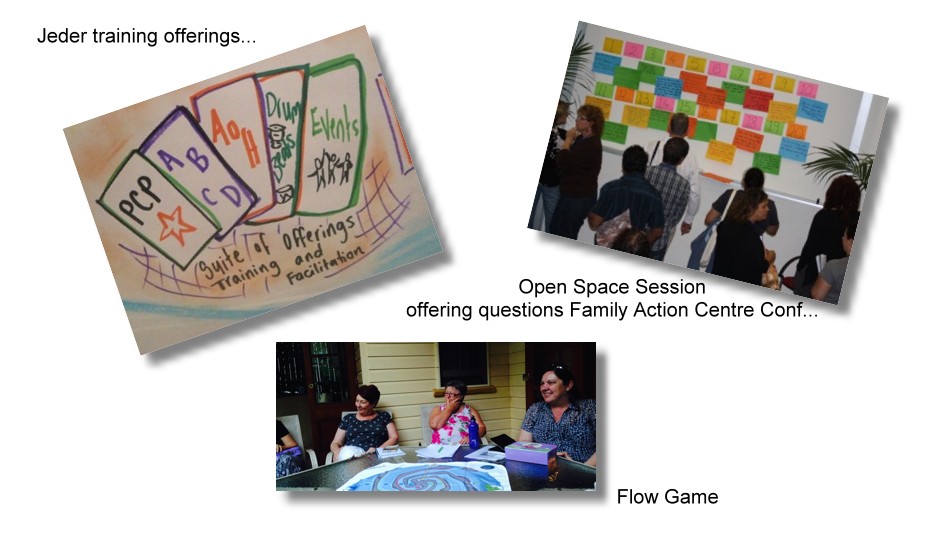
How: Co-Design,Design Thinking, Worldview Intelligence, Diffusion of Innovations, Sharing Economy, Gift Economy, Urban Commons, Teal Organisations
So, where am I now?
I’m on the teetering edge of emergence, heading into convergence. With almost two decades of divergence through practice and discovery, I now enter a space of community connection with a wealth of experience in helping others to discover what works and which philosophy or underpinning framework would be most beneficial for each group I work with. After all, as we know, each community is unique and should be approached openly, with respect to what is already present, undiscovered or available in their neighbourhoods.
Over dinner with Toke Moller one night at the Social Innovation Learning Village in 2015, I had an epiphany where I realised that nothing mattered anymore because, in fact, everything mattered! It felt like my 20 years of practical application was over and the next level of my work was at hand. I started delivering 2-day, jam-packed workshops, in Australia, with as many of these practices as reasonable and 5-day masterclass-type workshops in Indonesia with local communities and the Islamic Universities’ SILE project. From the feedback, people feel so ‘full’ of information and options that their heads hurt, in a good way, I’m told, but that doesn’t feel quite right – there’s got to be a better way and I believe it’s based in dialogue and connection!
I was fortunate to attend a Worldview Intelligence workshop, hosted by Shapeshift Strategies and the Meadowlark Institute, straight after the Assemblies in New Zealand in 2015, which highly encouraged me to synthesise my work into something more coherent so, part of my next personal step is to join other generous, gracious Art of Hosting practitioners at Kufunda Village this July for a learning journey and 24 hour a day immersion into what it’s like to live these processes and not just see them as a method or tool.
There are many other approaches and models to explore which support working in an authentic, community-led way such as; IAP2’s public participation spectrum (particularly when approached like this – the best reflection on the spectrum that I have read, by Max Hardy), deep democracy, citizen’s juries& deliberative democracy, place-making, time-banking, participatory budgeting and more but, throughout all these years, I have discovered that when working authentically and honestly, with a variety of communities, it comes back to what is simple, replicable, conversational and most of all, based on individual’s skills, abilities and capacities.
I recently spoke with Toke Moller again who said he had a conversation with Otto Scharmer (Theory U) where Otto told Toke that the ULabs which were working best were the ones who had Art of Hosting trained participants – this added to what I was hearing globally; that there is a larger convergence at work in the world and, I’m glad to be riding the wave!
In March 2016, I traveled to Brisbane to be part of a conversation, hosted by Toke Moller and Monica Nissen from Interchange in Denmark, about connecting global networks locally. The day was co-hosted by local Brisbane friends and colleagues,Purpose Partners, and was based on the convergence of any and all strengths-focused practices, models and philosophies from around Australia – it was an exciting day and it’s heartening to know that I’m not alone in this converging work!
For Jeder Institute, PCCD is on the increase with many people seeing the natural synergy of working this way within the NDIS and this work continues to be a foundational practice of the Jeder Institute. Plans are also underway for the 4th NSW Unconference in May 2016, the 2nd annual ABCD Festival in Goa, India in January 2017, in conjunction with the Bank of IDEAS and many others, where I will be delivering a blended workshop “Beyond the Basics” based on all of the above, also in 2016 there will be two DRUMBEAT Unconferences in partnership with Holyoake and I recently facilitated the inaugural Association of Bhutanese in Australia conference in Sydney and commenced Alternatives to Violence Project (AVP) facilitator training.
My job now, is not as a consultant; it is to enter a community with open heart, open mind and open will and to continue to offer these blended gifts to communities who are in crisis, those struggling with an issue or many who want to celebrate successes and my ongoing mission and aim is to build capacity in local neighbourhoods, through intentional conversations, underpinned by ABCD, and participatory leadership around today’s Wicked Problems, so that community members can immerse themselves in this important work; so they can host the processes, live an inclusionary life and celebrate the personal benefits of a connected community!
This is why I blend!






